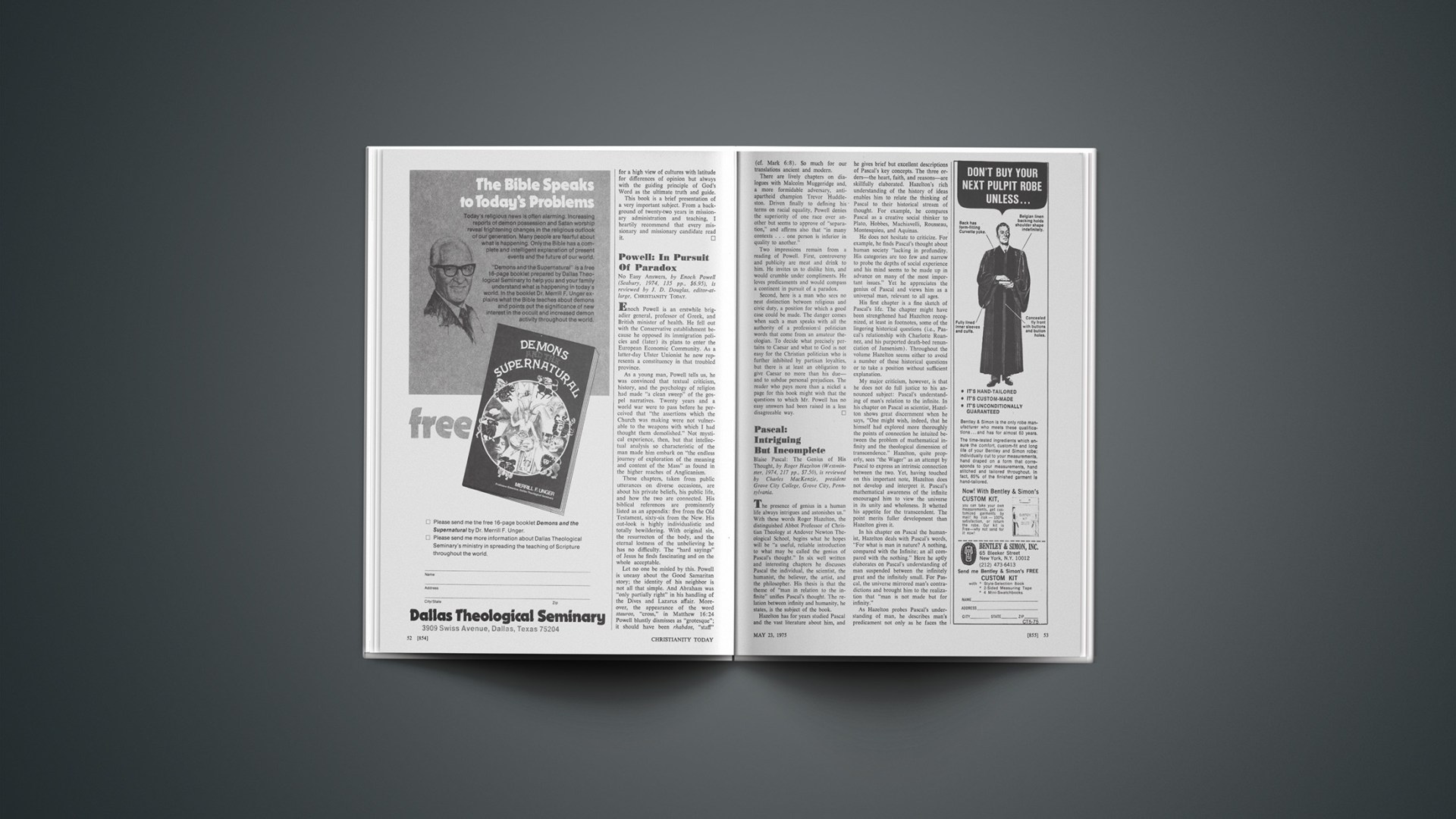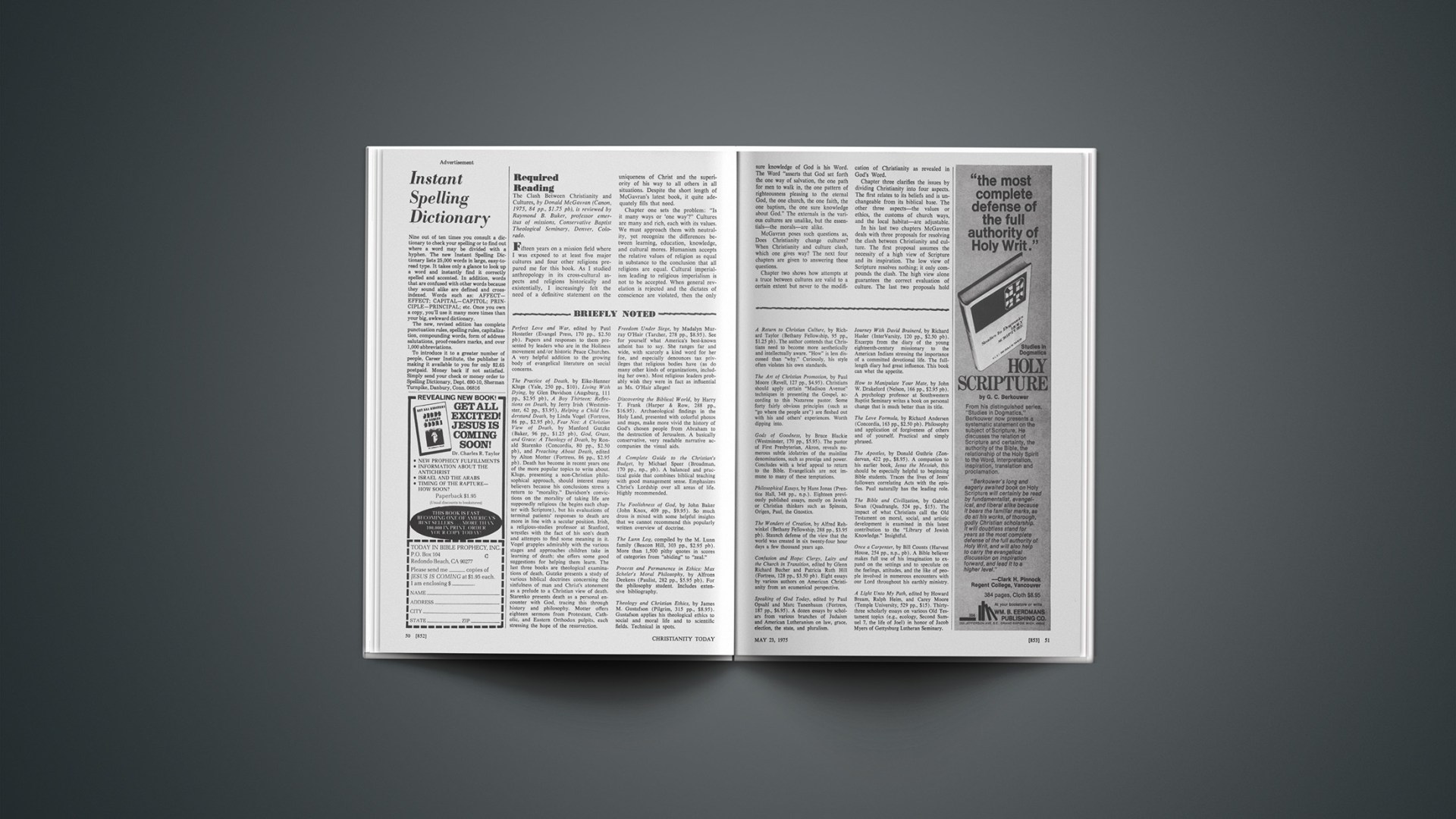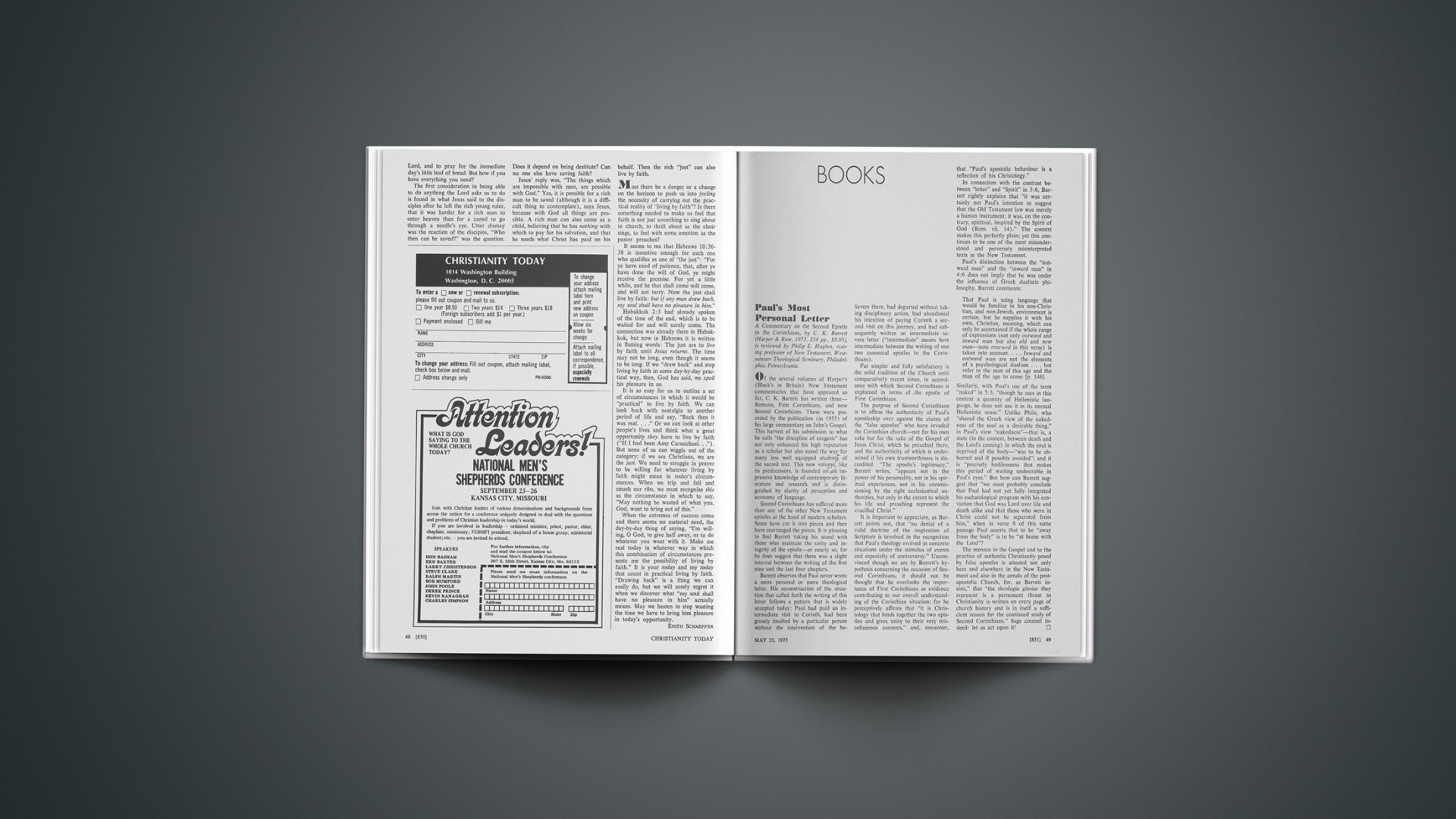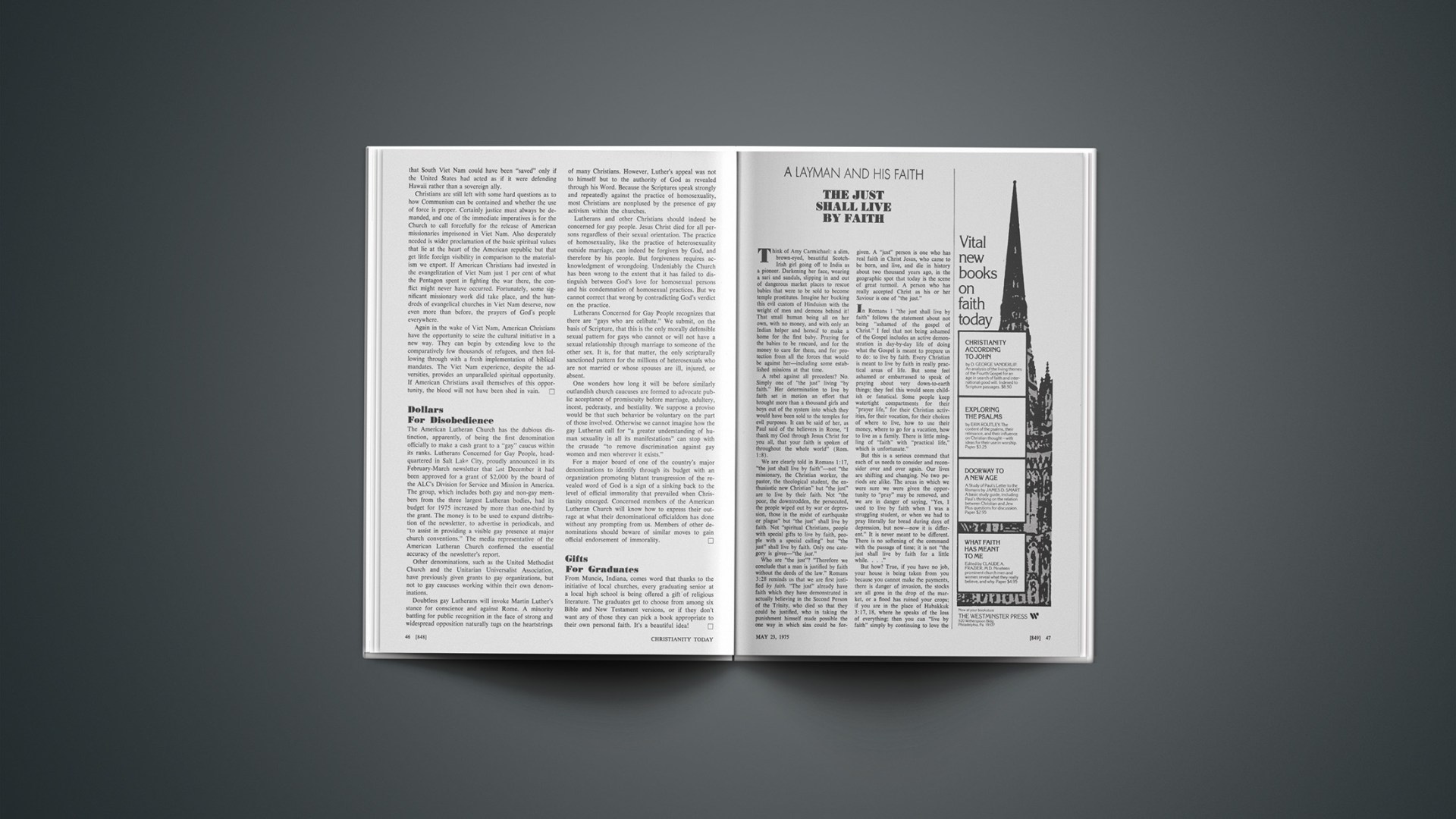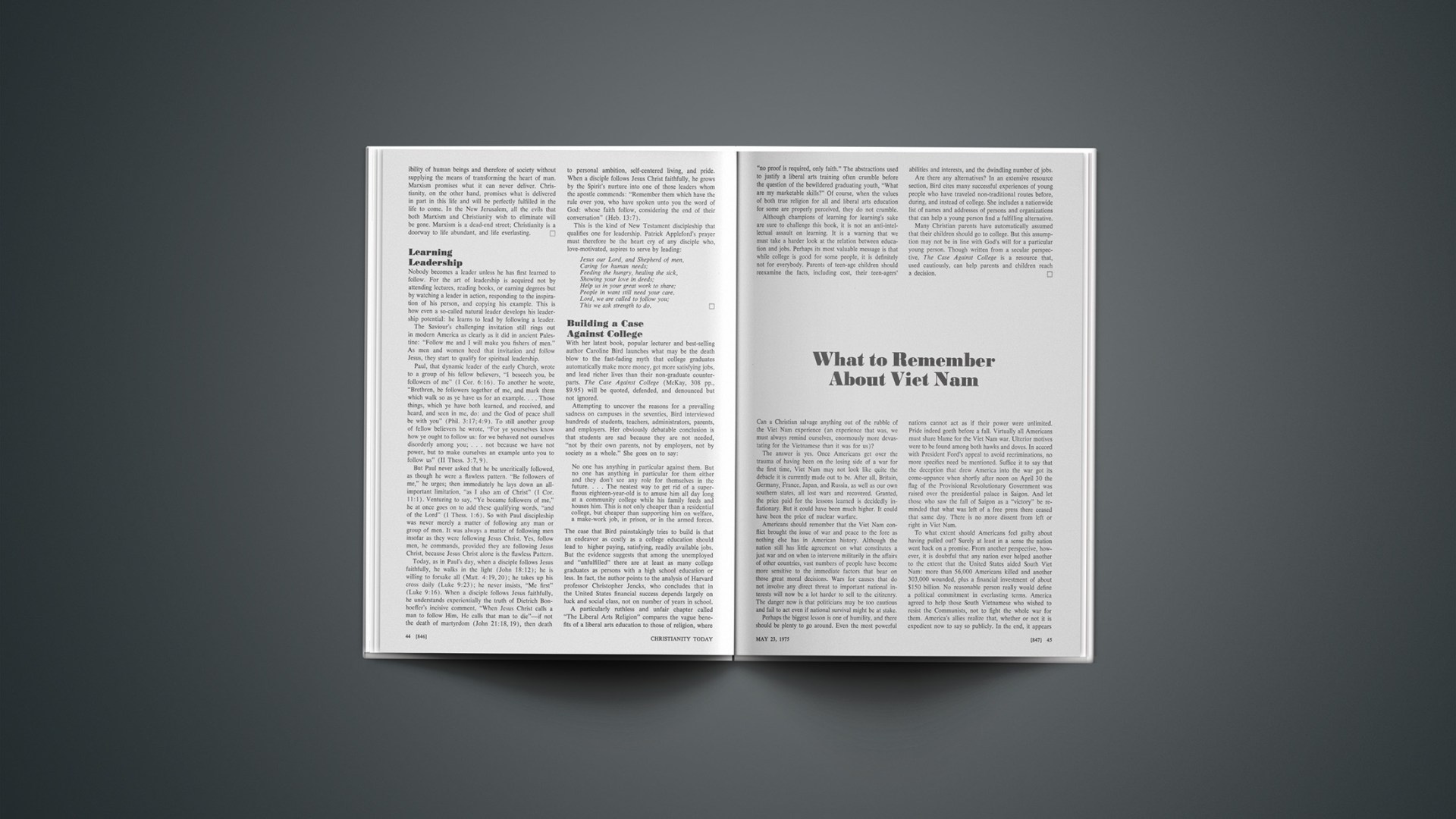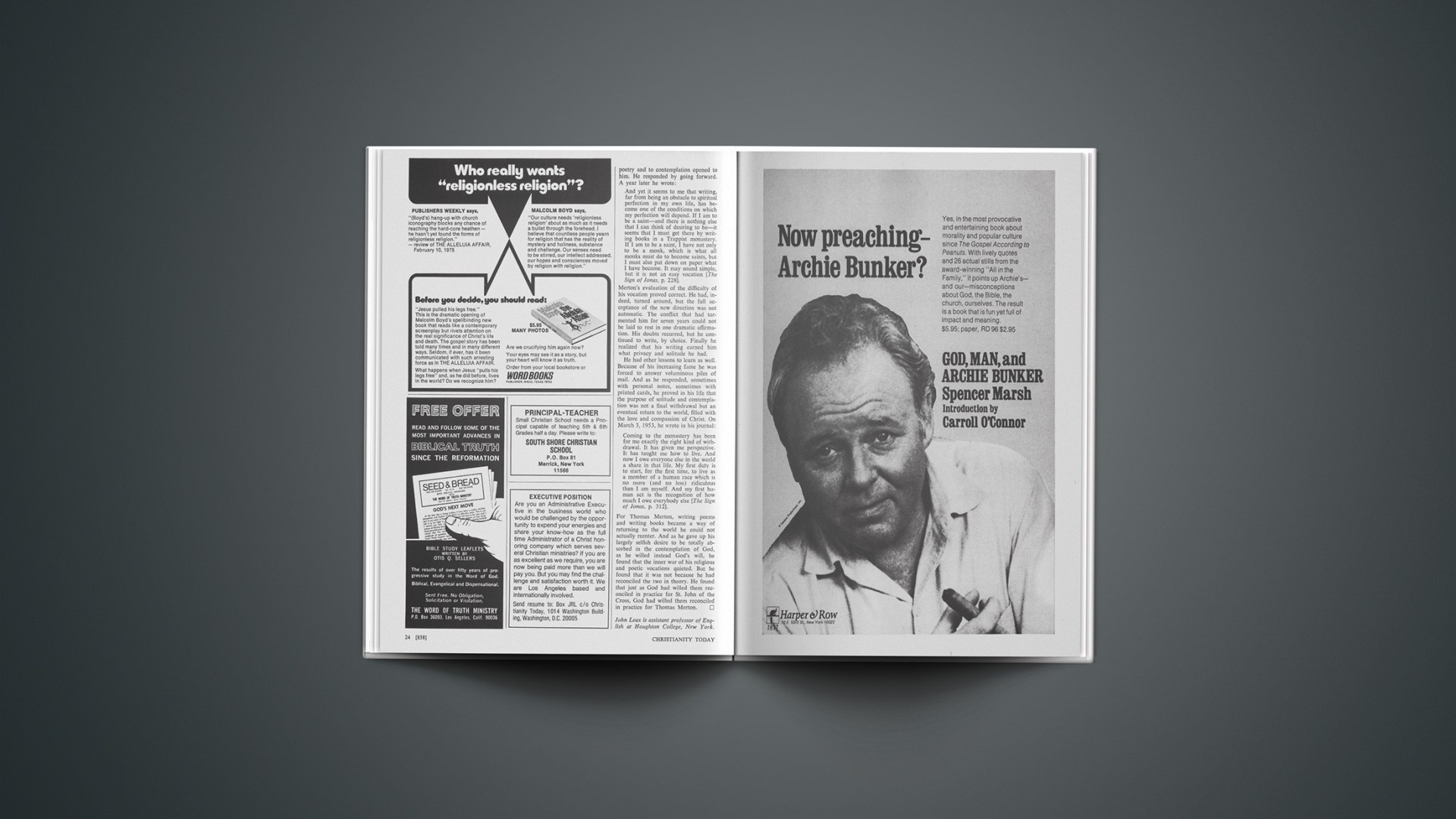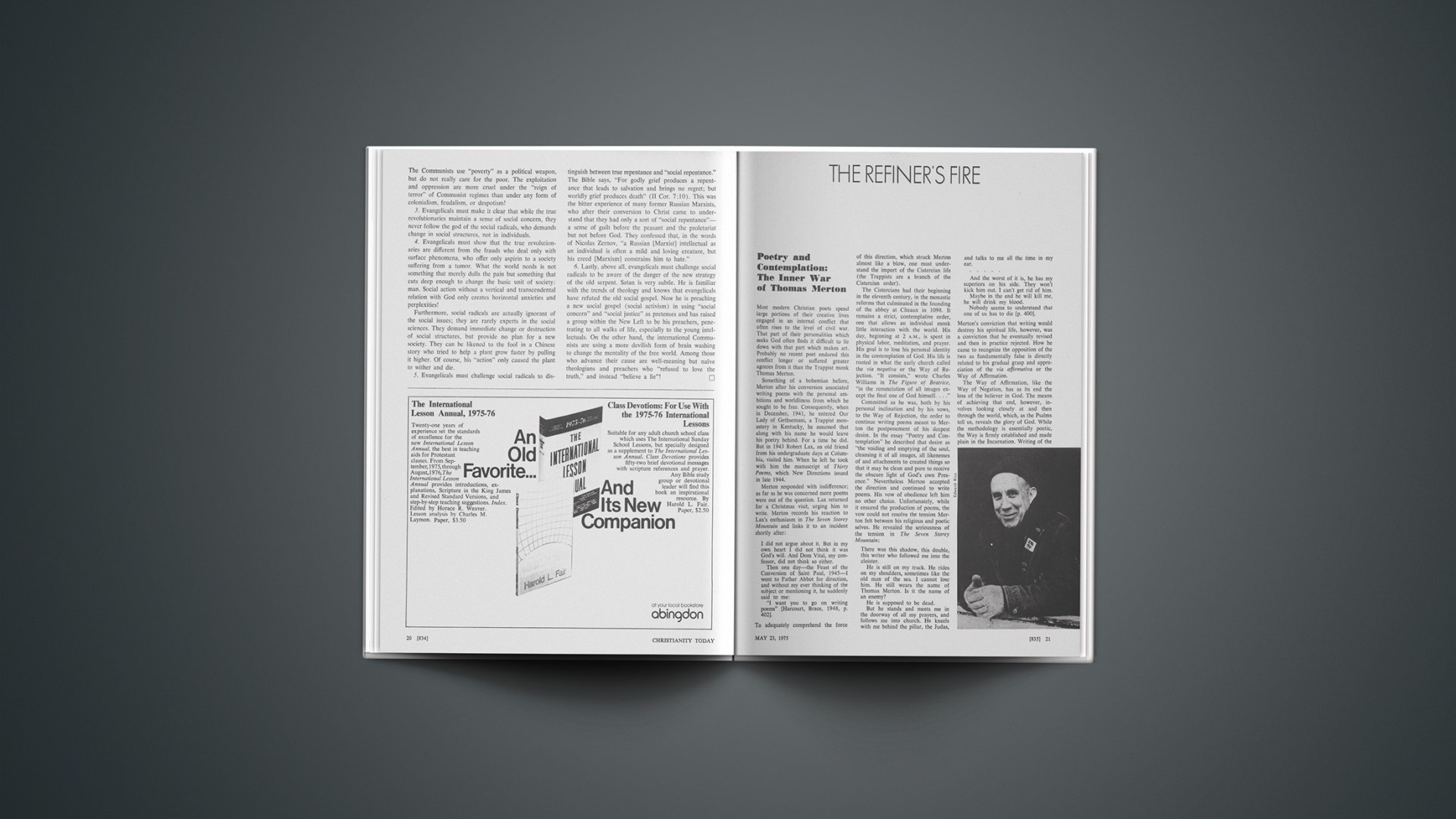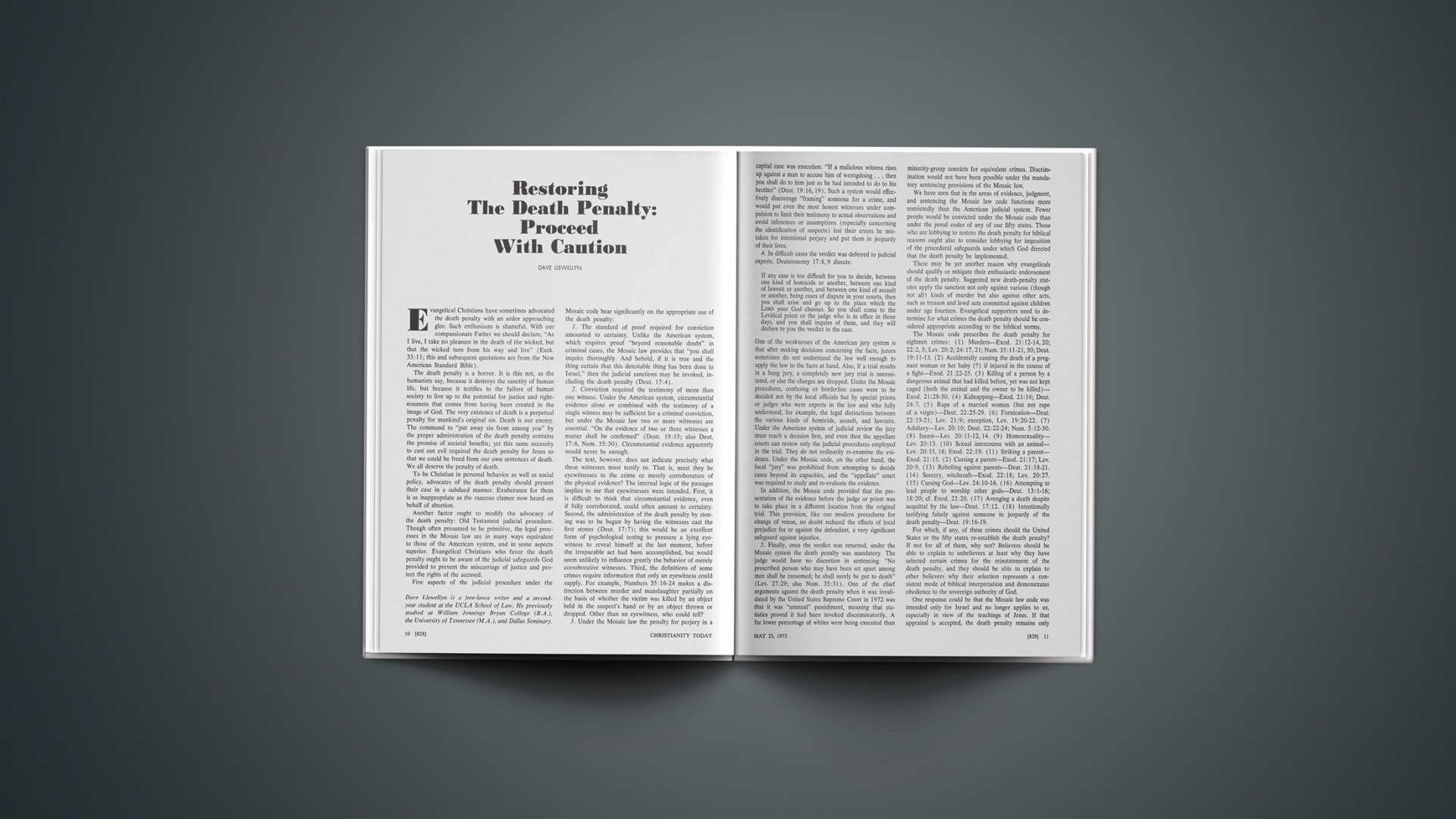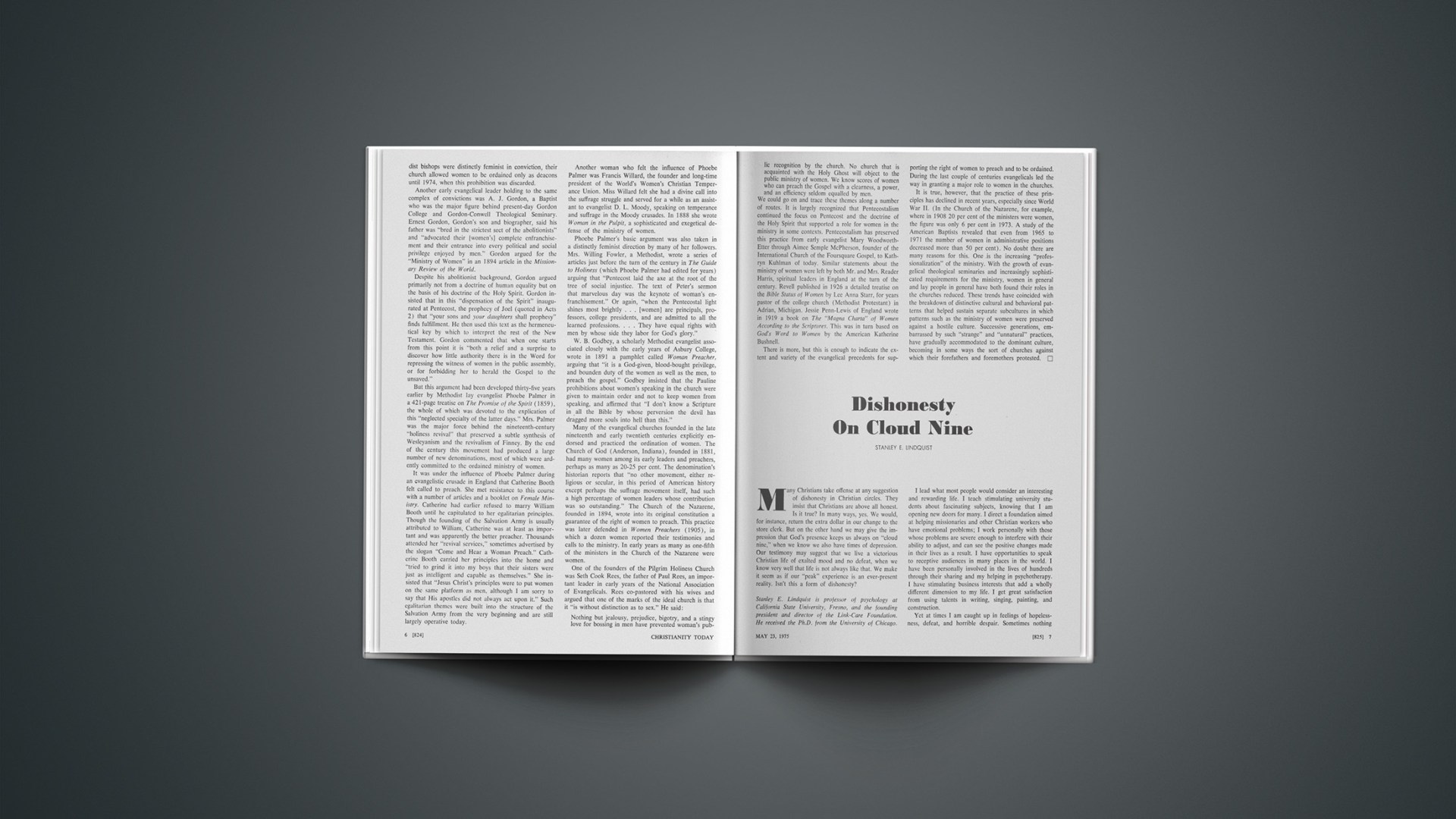Paul’S Most Personal Letter
A Commentary on the Second Epistle to the Corinthians, by C. K. Barrett (Harper & Row, 1973, 354 pp., $8.95), is reviewed by Philip E. Hughes, visiting professor of New Testament, Westminster Theological Seminary, Philadelphia, Pennsylvania.
Of the several volumes of Harper’s (Black’s in Britain) New Testament commentaries that have appeared so far, C. K. Barrett has written three—Romans, First Corinthians, and now Second Corinthians. These were preceded by the publication (in 1955) of his large commentary on John’s Gospel. This harvest of his submission to what he calls “the discipline of exegesis” has not only enhanced his high reputation as a scholar but also eased the way for many less well equipped students of the sacred text. This new volume; like its predecessors, is founded on an, impressive knowledge of contemporary literature and research and is distinguished by clarity of perception and economy of language.
Second Corinthians has suffered more than any of the other New Testament epistles at the hand of modern scholars. Some have cut it into pieces and then have rearranged the pieces. It is pleasing to find Barrett taking his stand with those who maintain the unity and integrity of the epistle—or nearly so, for he does suggest that there was a slight interval between the writing of the first nine and the last four chapters.
Barrett observes that Paul never wrote a more personal or more theological letter. His reconstruction of the situation that called forth the writing of this letter follows a pattern that is widely accepted today: Paul had paid an intermediate visit to Corinth, had been grossly insulted by a particular person without the intervention of the believers there, had departed without taking disciplinary action, had abandoned his intention of paying Corinth a second visit on this journey, and had subsequently written an intermediate severe letter (“intermediate” means here intermediate between the writing of our two canonical epistles to the Corinthians).
Far simpler and fully satisfactory is the solid tradition of the Church until comparatively recent times, in accordance with which Second Corinthians is explained in terms of the epistle of First Corinthians.
The purpose of Second Corinthians is to affirm the authenticity of Paul’s apostleship over against the claims of the “false apostles” who have invaded the Corinthian church—not for his own sake but for the sake of the Gospel of Jesus Christ, which he preached there, and the authenticity of which is undermined if his own trustworthiness is discredited. “The apostle’s legitimacy,” Barrett writes, “appears not in the power of his personality, not in his spiritual experiences, not in his commissioning by the right ecclesiastical authorities, but only in the extent to which his life and preaching represent the crucified Christ.”
It is important to appreciate, as Barrett points out, that “no denial of a valid doctrine of the inspiration of Scripture is involved in the recognition that Paul’s theology evolved in concrete situations under the stimulus of events and especially of controversy.” Unconvinced though we are by Barrett’s hypothesis concerning the occasion of Second Corinthians, it should not be thought that he overlooks the importance of First Corinthians as evidence contributing to our overall understanding of the Corinthian situation; for he perceptively affirms that “it is Christology that binds together the two epistles and gives unity to their very miscellaneous contents,” and, moreover, that “Paul’s apostolic behaviour is a reflection of his Christology.”
In connection with the contrast between “letter” and “Spirit” in 3:6, Barrett rightly explains that “it was certainly not Paul’s intention to suggest that the Old Testament law was merely a human instrument; it was, on the contrary, spiritual, inspired by the Spirit of God (Rom. 7:14).” The context makes this perfectly plain; yet this continues to be one of the most misunderstood and perversely misinterpreted texts in the New Testament.
Paul’s distinction between the “outward man” and the “inward man” in 4:6 does not imply that he was under the influence of Greek dualistic philosophy. Barrett comments:
That Paul is using language that would be familiar in his non-Christian, and non-Jewish, environment is certain, but he supplies it with his own, Christian, meaning, which can only be ascertained if the whole range of expressions (not only outward and inward man but also old and new man—note renewed in this verse) is taken into account.… Inward and outward man are not the elements of a psychological dualism … but refer to the man of this age and the man of the age to come [p. 146].
Similarly, with Paul’s use of the term “naked” in 5:3, “though he uses in this context a quantity of Hellenistic language, he does not use it in its normal Hellenistic sense.” Unlike Philo, who “shared the Greek view of the nakedness of the soul as a desirable thing,” in Paul’s view “nakedness”—that is, a state (in the context, between death and the Lord’s coming) in which the soul is deprived of the body—“was to be abhorred and if possible avoided”; and it is “precisely bodilessness that makes this period of waiting undesirable in Paul’s eyes.” But how can Barrett suggest that “we must probably conclude that Paul had not yet fully integrated his eschatological program with his conviction that God was Lord over life and death alike and that those who were in Christ could not be separated from him,” when in verse 8 of this same passage Paul asserts that to be “away from the body” is to be “at home with the Lord”?
The menace to the Gospel and to the practice of authentic Christianity posed by false apostles is attested not only here and elsewhere in the New Testament and also in the annals of the post-apostolic Church, for, as Barrett insists,” that “the theologia gloriae they represent is a permanent threat to Christianity is written on every page of church history and is in itself a sufficient reason for the continued study of Second Corinthians.” Sage counsel indeed: let us act upon it!
Required Reading
The Clash Between Christianity and Cultures, by Donald McGavran (Canon, 1975, 84 pp., $1.75 pb), is reviewed by Raymond B. Buker, professor emeritus of missions, Conservative Baptist Theological Seminary, Denver, Colorado.
Fifteen years on a mission field where I was exposed to at least five major cultures and four other religions prepared me for this book. As I studied anthropology in its cross-cultural aspects and religions historically and existentially, I increasingly felt the need of a definitive statement on the uniqueness of Christ and the superiority of his way to all others in all situations. Despite the short length of McGavran’s latest book, it quite adequately fills that need.
Chapter one sets the problem: “Is it many ways or ‘one way’?” Cultures are many and rich, each with its values. We must approach them with neutrality, yet recognize the differences between learning, education, knowledge, and cultural mores. Humanism accepts the relative values of religion as equal in substance to the conclusion that all religions are equal. Cultural imperialism leading to religious imperialism is not to be accepted. When general revelation is rejected and the dictates of conscience are violated, then the only sure knowledge of God is his Word. The Word “asserts that God set forth the one way of salvation, the one path for men to walk in, the one pattern of righteousness pleasing to the eternal God, the one church, the one faith, the one baptism, the one sure knowledge about God.” The externals in the various cultures are unalike, but the essentials—the morals—are alike.
McGavran poses such questions as, Does Christianity change cultures? When Christianity and culture clash, which one gives way? The next four chapters are given to answering these questions.
Chapter two shows how attempts at a truce between cultures are valid to a certain extent but never to the modification of Christianity as revealed in God’s Word.
Chapter three clarifies the issues by dividing Christianity into four aspects. The first relates to its beliefs and is unchangeable from its biblical base. The other three aspects—the values or ethics, the customs of church ways, and the local habitat—are adjustable.
In his last two chapters McGavran deals with three proposals for resolving the clash between Christianity and culture. The first proposal assumes the necessity of a high view of Scripture and its inspiration. The low view of Scripture resolves nothing; it only compounds the clash. The high view alone guarantees the correct evaluation of culture. The last two proposals hold for a high view of cultures with latitude for differences of opinion but always with the guiding principle of God’s Word as the ultimate truth and guide.
This book is a brief presentation of a very important subject. From a background of twenty-two years in missionary administration and teaching, I heartily recommend that every missionary and missionary candidate read it.
BRIEFLY NOTED
Perfect Love and War, edited by Paul Hostetler (Evangel Press, 170 pp., $2.50 pb). Papers and responses to them presented by leaders who are in the Holiness movement and/or historic Peace Churches. A very helpful addition to the growing body of evangelical literature on social concerns.
The Practice of Death, by Eike-Henner Kluge (Yale, 250 pp., $10), Living With Dying, by Glen Davidson (Augsburg, 111 pp., $2.95 pb), A Boy Thirteen: Reflections on Death, by Jerry Irish (Westminster, 62 pp., $3.95), Helping a Child Understand Death, by Linda Vogel (Fortress, 86 pp., $2.95 pb), Fear Not: A Christian View of Death, by Manford Gutzke (Baker, 96 pp., $1.25 pb), God, Grass, and Grace: A Theology of Death, by Ronald Starenko (Concordia, 80 pp., $2.50 pb), and Preaching About Death, edited by Alton Motter (Fortress, 86 pp., $2.95 pb). Death has become in recent years one of the more popular topics to write about. Kluge, presenting a non-Christian philosophical approach, should interest many believers because his conclusions stress a return to “morality.” Davidson’s convictions on the morality of taking life are supposedly religious (he begins each chapter with Scripture), but his evaluations of terminal patients’ responses to death are more in line with a secular position. Irish, a religious-studies professor at Stanford, wrestles with the fact of his son’s death and attempts to find some meaning in it. Vogel grapples admirably with the various stages and approaches children take in learning of death; she offers some good suggestions for helping them learn. The last three books are theological examinations of death. Gutzke presents a study of various biblical doctrines concerning the sinfulness of man and Christ’s atonement as a prelude to a Christian view of death. Starenko presents death as a personal encounter with God, tracing this through history and philosophy. Motter offers eighteen sermons from Protestant, Catholic, and Eastern Orthodox pulpits, each stressing the hope of the resurrection.
Freedom Under Siege, by Madalyn Murray O’Hair (Tarcher, 278 pp., $8.95). See for yourself what America’s best-known atheist has to say. She ranges far and wide, with scarcely a kind word for her foe, and especially denounces tax privileges that religious bodies have (as do many other kinds of organizations, including her own). Most religious leaders probably wish they were in fact as influential as Ms. O’Hair alleges!
Discovering the Biblical World, by Harry T. Frank (Harper & Row, 288 pp., $16.95). Archaeological findings in the Holy Land, presented with colorful photos and maps, make more vivid the history of God’s chosen people from Abraham to the destruction of Jerusalem. A basically conservative, very readable narrative accompanies the visual aids.
A Complete Guide to the Christian’s Budget, by Michael Speer (Broadman, 170 pp., np., pb). A balanced and practical guide that combines biblical teaching with good management sense. Emphasizes Christ’s Lordship over all areas of life. Highly recommended.
The Foolishness of God, by John Baker (John Knox, 409 pp., $9.95). So much dross is mixed with some helpful insights that we cannot recommend this popularly written overview of doctrine.
The Lunn Log, compiled by the M. Lunn family (Beacon Hill, 303 pp., $2.95 pb). More than 1,500 pithy quotes in scores of categories from “abiding” to “zeal.”
Process and Permanence in Ethics: Max Scheler’s Moral Philosophy, by Alfrons Deekens (Paulist, 282 pp., $5.95 pb). For the philosophy student. Includes extensive bibliography.
Theology and Christian Ethics, by James M. Gustafson (Pilgrim, 315 pp., $8.95). Gustafson applies his theological ethics to social and moral life and to scientific fields. Technical in spots.
A Return to Christian Culture, by Richard Taylor (Bethany Fellowship, 95 pp., $1.25 pb). The author contends that Christians need to become more aesthetically and intellectually aware. “How” is less discussed than “why.” Curiously, his style often violates his own standards.
The Art of Christian Promotion, by Paul Moore (Revell, 127 pp., $4.95). Christians should apply certain “Madison Avenue” techniques in presenting the Gospel, according to this Nazarene pastor. Some forty fairly obvious principles (such as “go where the people are”) are fleshed out with his and others’ experiences. Worth dipping into.
Gods of Goodness, by Bruce Blackie (Westminster, 170 pp., $5.95). The pastor of First Presbyterian, Akron, reveals numerous subtle idolatries of the mainline denominations, such as prestige and power. Concludes with a brief appeal to return to the Bible. Evangelicals are not immune to many of these temptations.
Philosophical Essays, by Hans Jonas (Prentice Hall, 348 pp., n.p.). Eighteen previously published essays, mostly on Jewish or Christian thinkers such as Spinoza, Origen, Paul, the Gnostics.
The Wonders of Creation, by Alfred Rehwinkel (Bethany Fellowship, 288 pp., $3.95 pb). Staunch defense of the view that the world was created in six twenty-four hour days a few thousand years ago.
Confusion and Hope: Clergy, Laity and the Church in Transition, edited by Glenn Richard Bucher and Patricia Ruth Hill (Fortress, 128 pp., $3.50 pb). Eight essays by various authors on American Christianity from an ecumenical perspective.
Speaking of God Today, edited by Paul Opsahl and Marc Tanenbaum (Fortress, 187 pp., $6.95). A dozen essays by scholars from various branches of Judaism and American Lutheranism on law, grace, election, the state, and pluralism.
Journey With David Brainerd, by Richard Hasler (InterVarsity, 120 pp., $2.50 pb). Excerpts from the diary of the young eighteenth-century missionary to the American Indians stressing the importance of a committed devotional life. The full-length diary had great influence. This book can whet the appetite.
How to Manipulate Your Mate, by John W. Drakeford (Nelson, 166 pp., $2.95 pb). A psychology professor at Southwestern Baptist Seminary writes a book on personal change that is much better than its title.
The Love Formula, by Richard Andersen (Concordia, 163 pp., $2.50 pb). Philosophy and application of forgiveness of others and of yourself. Practical and simply phrased.
The Apostles, by Donald Guthrie (Zondervan, 422 pp., $8.95). A companion to his earlier book, Jesus the Messiah, this should be especially helpful to beginning Bible students. Traces the lives of Jesus’ followers correlating Acts with the epistles. Paul naturally has the leading role.
The Bible and Civilization, by Gabriel Sivan (Quadrangle, 524 pp., $15). The impact of what Christians call the Old Testament on moral, social, and artistic development is examined in this latest contribution to the “Library of Jewish Knowledge.” Insightful.
Once a Carpenter, by Bill Counts (Harvest House, 254 pp., n.p., pb). A Bible believer makes full use of his imagination to expand on the settings and to speculate on the feelings, attitudes, and the like of people involved in numerous encounters with our Lord throughout his earthly ministry.
A Light Unto My Path, edited by Howard Bream, Ralph Heim, and Carey Moore (Temple University, 529 pp., $15). Thirty-three scholarly essays on various Old Testament topics (e.g., ecology, Second Samuel 7, the life of Joel) in honor of Jacob Myers of Gettysburg Lutheran Seminary.
Powell: In Pursuit Of Paradox
No Easy Answers, by Enoch Powell (Seabury, 1974, 135 pp., $6.95), is reviewed by J. D. Douglas, editor-at-large, CHRISTIANITY TODAY.
Enoch Powell is an erstwhile brigadier general, professor of Greek, and British minister of health. He fell out with the Conservative establishment because he opposed its immigration policies and (later) its plans to enter the European Economic Community. As a latter-day Ulster Unionist he now represents a constituency in that troubled province.
As a young man, Powell tells us, he was convinced that textual criticism, history, and the psychology of religion had made “a clean sweep” of the gospel narratives. Twenty years and a world war were to pass before he perceived that “the assertions which the Church was making were not vulnerable to the weapons with which I had thought them demolished.” Not mystical experience, then, but that intellectual analysis so characteristic of the man made him embark on “the endless journey of exploration of the meaning and content of the Mass” as found in the higher reaches of Anglicanism.
These chapters, taken from public utterances on diverse occasions, are about his private beliefs, his public life, and how the two are connected. His biblical references are prominently listed as an appendix: five from the Old Testament, sixty-six from the New. His out-look is highly individualistic and totally bewildering. With original sin, the resurrecton of the body, and the eternal lostness of the unbelieving he has no difficulty. The “hard sayings” of Jesus he finds fascinating and on the whole acceptable.
Let no one be misled by this. Powell is uneasy about the Good Samaritan story; the identity of his neighbor is not all that simple. And Abraham was “only partially right” in his handling of the Dives and Lazarus affair. Moreover, the appearance of the word stauros, “cross,” in Matthew 16:24 Powell bluntly dismisses as “grotesque”; it should have been rhabdos, “staff” (cf. Mark 6:8). So much for our translations ancient and modern.
There are lively chapters on dialogues with Malcolm Muggeridge and, a more formidable adversary, antiapartheid champion Trevor Huddleston. Driven finally to defining his terms on racial equality, Powell denies the superiority of one race over another but seems to approve of “separation,” and affirms also that “in many contexts … one person is inferior in quality to another.”
Two impressions remain from a reading of Powell. First, controversy and publicity are meat and drink to him. He invites us to dislike him, and would crumble under compliments. He loves predicaments and would compass a continent in pursuit of a paradox.
Second, here is a man who sees no neat distinction between religious and civic duty, a position for which a good case could be made. The danger comes when such a man speaks with all the authority of a professional politician words that come from an amateur theologian. To decide what precisely pertains to Caesar and what to God is not easy for the Christian politician who is further inhibited by partisan loyalties, but there is at least an obligation to give Caesar no more than his due—and to subdue personal prejudices. The reader who pays more than a nickel a page for this book might wish that the questions to which Mr. Powell has no easy answers had been raised in a less disagreeable way.
Pascal Intriguing But Incomplete
Blaise Pascal: The Genius of His Thought, by Roger Hazelton (Westminster, 1974, 217 pp., $7.50), is reviewed by Charles MacKenzie, president Grove City College, Grove City, Pennsylvania.
The presence of genius in a human life always intrigues and astonishes us.” With these words Roger Hazelton, the distinguished Abbot Professor of Christian Theology at Andover Newton Theological School, begins what he hopes will be “a useful, reliable introduction to what may be called the genius of Pascal’s thought.” In six well written and interesting chapters he discusses Pascal the individual, the scientist, the humanist, the believer, the artist, and the philosopher. His thesis is that the theme of “man in relation to the infinite” unifies Pascal’s thought. The relation between infinity and humanity, he states, is the subject of the book.
Hazelton has for years studied Pascal and the vast literature about him, and he gives brief but excellent descriptions of Pascal’s key concepts. The three orders—the heart, faith, and reasons—are skillfully elaborated. Hazelton’s rich understanding of the history of ideas enables him to relate the thinking of Pascal to their historical stream of thought. For example, he compares Pascal as a creative social thinker to Plato, Hobbes, Machiavelli, Rousseau, Montesquieu, and Aquinas.
He does not hesitate to criticize. For example, he finds Pascal’s thought about human society “lacking in profundity. His categories are too few and narrow to probe the depths of social experience and his mind seems to be made up in advance on many of the most important issues.” Yet he appreciates the genius of Pascal and views him as a universal man, relevant to all ages.
His first chapter is a fine sketch of Pascal’s life. The chapter might have been strengthened had Hazelton recognized, at least in footnotes, some of the lingering historical questions (i.e., Pascal’s relationship with Charlotte Roannez, and his purported death-bed renunciation of Jansenism). Throughout the volume Hazelton seems either to avoid a number of these historical questions or to take a position without sufficient explanation.
My major criticism, however, is that he does not do full justice to his announced subject: Pascal’s understanding of man’s relation to the infinite. In his chapter on Pascal as scientist, Hazelton shows great discernment when he says, “One might wish, indeed, that he himself had explored more thoroughly the points of connection he intuited between the problem of mathematical infinity and the theological dimension of transcendence.” Hazelton, quite properly, sees “the Wager” as an attempt by Pascal to express an intrinsic connection between the two. Yet, having touched on this important note, Hazelton does not develop and interpret it. Pascal’s mathematical awareness of the infinite encouraged him to view the universe in its unity and wholeness. It whetted his appetite for the transcendent. The point merits fuller development than Hazelton gives it.
In his chapter on Pascal the humanist, Hazelton deals with Pascal’s words, “For what is man in nature? A nothing, compared with the Infinite; an all compared with the nothing.” Here he aptly elaborates on Pascal’s understanding of man suspended between the infinitely great and the infinitely small. For Pascal, the universe mirrored man’s contradictions and brought him to the realization that “man is not made but for infinity.”
As Hazelton probes Pascal’s understanding of man, he describes man’s predicament not only as he faces the physical universe but also as he is confronted by the moral plane of existence. Imagination, custom, and self-love deceive man. At this point, Hazelton does not follow Pascal in tracing man’s misery and blindness to their source in man’s sin. To Pascal, the sin of man, his distorted self-love, his proclivity to play god, are barriers separating man from the infinite. Yet Hazelton, strangely enough, does not relate the miseries of man to the sin that has alienated him from the infinite.
When Hazelton deals with Pascal as a believer, again he neglects Pascal’s consciousness of sin. In dealing with Pascal’s treatment of “the hidden God,” he has the chance to elaborate on Pascal’s thought that man’s sin, self-love, and pretensions to be God blind him to the truth of God. But he lets it pass with the observation that “God’s hiddenness … is also secondarily due to man’s contrary mindedness.” Hazelton mentions Pascal’s view of sin when he discusses grace, but even then he does not acknowledge Pascal’s teaching on the nature of sin, the effects of sin on the thought processes of man, or sin as a barrier between man and the infinite.
Another deficiency in an otherwise creditable chapter on Pascal as a believer is Hazelton’s neglect of Pascal’s view of the Bible and the Church. Pascal drew much strength, wisdom, and inspiration from the Bible, which he accepted as the unique, inspired, authoritative Word of the infinite God. Yet Hazelton gives little hint of this. Pascal also had deep convictions about the Church. Hazelton mentions those Gallican tendencies that led Pascal to see the authority of church councils as superior to the authority of the pope. But he shows little awareness that Pascal found fulfillment for his essential selfhood in the Body of Christ. Hazelton says, “One wishes that Pascal had distinguished sick self-love or amour propre from the healthy amour de soi … but he did not.” But he did! Pascal saw the Body of Christ as that fellowship which purifies one’s self-love and transforms amour propre into a healthy amour de soi: “By loving the body it loves itself because it has no being except through and for the sake of the body.… We love ourselves because we are members of Jesus Christ” (Pensée 688).
In dealing with Pascal the artist, Hazelton skillfully analyzes both Pascal’s art of persuading and the artistry he displayed in the “Provincial Letters” and the “Pensées.” When he deals with Pascal’s sources and models, he has an opportunity to analyze Pascal’s estimate of the Bible as a revelation of the infinite to man. But he does not do so. And so this chapter, though well done and informative, contributes little to Hazelton’s chosen thesis—man’s relation to the infinite.
Turning to Pascal as a philosopher, Hazelton aptly distinguishes Pascal from Descartes. He summarizes what he believes to be Pascal’s epistemology. And he accurately describes the dialectical and existential nature of Pascal’s thought. With great insight he speaks of Pascal’s “pensée de derriére la tête,” a type of presupposition underlying all Pascal’s thinking. The closest, however, that Hazelton comes to defining that “pensée de derriére” is an “idea of the whole.” He does not recognize that the infinite, the God of biblical revelation, is the basic presupposition of Pascal’s mature thought.
Consequently Hazelton makes the very unpascalian statement that faith for Pascal “remains an uncertain certitude.” He says, “If we miss in Pascal the decisive flourish, the conclusive word regarding truth, it may at least be argued that this lack represents an openness to truth on his part which cannot be found in those philosophies which claim to have defined it.” Such statements may have been true of the early Pascal but certainly are not characteristic of the mature man. Again, when Hazelton declares that “Pascal was not among those Christian thinkers who claim that Christianity is inherently superior to all other religions” he shortchanges Pascal, who was certain that Christ was the ultimate and absolute revelation of the infinite even though He cannot be completely identified with or separated from Christianity in general and the Church in particular.
Roger Hazelton’s book is an intriguing interpretation of one of the great geniuses of history. It contains a host of valuable insights, and as an “introduction to … the genius of Pascal’s thought” it is eminently useful. It could have become a high-water mark in Pascalian research if the author had really described the fullness of Pascal’s mature thought on man’s relation to the infinite.
However, this stated theme tends to get lost in the book. Much that Pascal said on the subject is neglected or is passed over lightly. The author fails to deal with Pascal’s understanding of the infinite in the finite, a presence that confronted Pascal in the contradictions of philosophy and the silent mysteries of science. He fails above all to describe the fullness of the revelation of the infinite, a revelation made throughout thousands of years of Jewish-Christian history, supremely given in the historical Jesus, and continuously offered to mankind through the Bible and the Church. Helpful and valuable as this book is, it gives us only a partial view of Pascal and of his understanding of man’s relation to the infinite.

